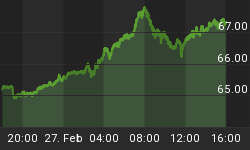Greenspan on questionable subprime lending tactics:
 "While I was aware a lot of these [questionable lending] practices were going on, I had no notion of how significant they had become until very late...I really didn't get it until very late in 2005 and 2006".
"While I was aware a lot of these [questionable lending] practices were going on, I had no notion of how significant they had become until very late...I really didn't get it until very late in 2005 and 2006".
Greenspan Defends Low Interest Rates ~ 60 Minutes
After Greenspan 'got it', and before the toxic paper started to blowup, what did he think about the U.S. housing market? That the worst was over, of course:
"I suspect that we are coming to the end of this [housing] downtrend, as applications for new mortgages, the most important series, have flattened out...I think the worst of this may well be over" Alan Greenspan. October 1, 2006
Yes, Alan Greenspan - who will appear on '60 Minutes' this Sunday and release 'Age of Turbulence' on Monday - is up to his old tricks again: those being to say one thing and mean another, all the while contradicting what he previously said. As a quick example, Greenspan said in 1996 that he recognized the "stock market bubble problem" but he later (after doing nothing to stop the mania) concluded that bubbles are not identifiable until they burst. Now Greenspan claims that while he was aware of reckless subprime lending tactics (in 'around 2000'-Gramlich), he didn't understand how widespread the practice was until 2006, or about the same time he was calling for a bottom in the U.S. housing market. Who wouldn't want to read a book written by someone so fascinatingly mad?
Some blame Greenspan for credit crisis - Independent
For the record, temporary Fed interventions are sometimes required to avert financial calamity in the United States. For better, or more likely worse, this is also the way most of the world works (i.e. after a financial crisis the central bank tries to contain the damage, and if they are successful most people forget that the central bank helped cause the crisis in the first place). In this context there is nothing specifically right/wrong with Greenspan's Fed cutting interest rates to 1% in 2003, and doing everything possible after the Crash in 1987, LTCM in 1998, and 9/11, to restore investor confidence in the markets. This is the way things work.
With that said, there is something seriously deranged about a 'maestro' that contends asset bubbles are only identifiable after they blowup, that predatory lending practices should be ignored, that hedge fund regulation is for the birds, and that the unregulated OTC derivatives market disperses risk solely to those that can afford to lose. Although regulatory efforts can sometimes stifle free market activities, the alternative is not to mindlessly condone any and all forms of deregulation. During his tenure as Fed Chair Greenspan did exactly that, and as CBS suggests, he is showing little sign of regret:
Even though one of the Federal Reserve governors raised a red flag on those lending practices, Greenspan says there was little he could do. "Well, it was nothing to look into, particularly because we knew there was a number of such practices going on, but it's very difficult for banking regulators to deal with that"
Difficult or not Mr. Greenspan you try to deal with it or, at minimum, you repeatedly acknowledge that there is a problem so that other regulatory bodies or voices can step into the fray. What you don't do is nothing.
To reiterate previous sentiments, if Fed policies are not sometimes calibrated to inhibit reckless behavior in the financial markets, timely bailouts serve to perpetually nurture dangerous asset price bubbles. In Greenspan's case, the 2000-2002 stock market bust was followed up by the real estate mania. Despite claiming otherwise, Greenspan knew that both of these manias would end in tears. What he didn't know was exactly when.
Will the real Greenspan stand up next week and say something of substance? Will he go back to his roots and extol the advantages of a gold standard, elaborate on why he did nothing to contain the most blatantly obvious stock market bubble in history, and apologize for suggesting that adjustable-rate mortgages were the way to go in 2004? Probably not. Instead Greenspan will likely stick to his shtick: that the Federal Reserve Board has no business targeting asset prices, so long as asset prices are rising.
For the record, Greenspan's greatest mistake was not orchestrating too many bailouts as most of his critics claim, but that he undertook no initiatives to ensure the long-term stability of the U.S. financial markets. This inaction on the regulatory front didn't seem to matter when king dollar ruled, no other country(ies) was driving global growth, and toxic subprime paper was be written rather than written off. But as Greenspan himself suggests, this may no longer the case today:
"We were dealing in an environment back there where inflation was easing. We could have acted without the fear of stoking inflationary pressures. You can't do that anymore..."
What you can do is blame Greenspan for helping to create the subprime mess, the hedge fund mess, and the OTC derivatives monster. If you feel the need, you can also throw the weak dollar into the mix.
But just as the 'blame Greenspan' theme threatens to get rolling next week everyone will pause, abandon their senses, and beg the Fed for help. After all, while Greenspan's book will be released on Monday, Bernanke's first kick at the rate-cut-can is scheduled for Tuesday.
Sir Alan will no doubt watch with much pride and admiration as money managers quickly go from hedging their risk against comments from a former Fed Chairman to adopting a bullish straddle against the current Fed Chairman...all done in unregulated markets with untold amounts of borrowed/leveraged money, of course.















